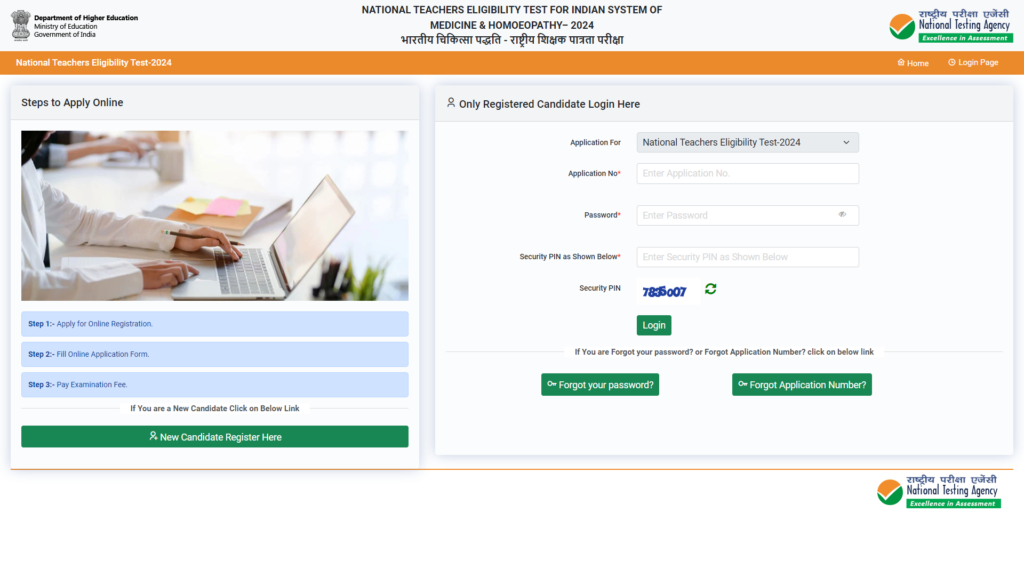NTET Exam Syllabus
Syllabus for NTET for AYUSH Teachers
| Sl. No. | UNITS | Contents |
| 1 | Teaching & Training | · Teaching: Concept, Objectives, Levels of teaching (Memory, Understanding and Reflective), Characteristics, and basic requirements.
· Teaching methods, new methods of teaching (approach). · Utilization of Basic teaching and basic skills of teaching. · Understanding Learner’s characteristics: Characteristics of adolescent and adult learners (Academic, Social, Emotional, and Cognitive), Individual differences. · Factors affecting teaching related to: Teacher, Learner, Support material, Instructional facilities, Learning environment and Institution. · Methods of clinical teaching/ bedside teaching · Learning styles – VARK – Visual, Aural/Auditory, Reading/Writing & Kinesthetic |
| 2 | Communication | · Communication: Meaning, types, characteristics and purpose of communication.
· Effective communication: Verbal and Non-verbal, Inter-Cultural and group Communications, Classroom communication · Barriers to effective communication · Mass-Media and Society · Teacher-Learner communication · Doctor-Patient communication |
| 3 | Classroom Management | · Classroom Management
· Practical Classroom Management · Psychology & Classroom Management · Personal Approach to Classroom Management · Ensuring Engagement & Motivation in the Classroom · Routines & Technology in the Classroom · Forming Positive Learning Environments · Disciplinary Problems · Management Strategies for Diverse Classrooms · Managing classroom and other learning environments (clinical, OPD, Practical labs, skill labs, community outreach) |
| 4 | Assessment Methods | · Concepts and principles of Learning assessment
· Evaluation in choice Based Credit System in Higher education · Computer-based Testing · Consideration of Innovations in evaluation systems · Assessment of clinical competence · Role of observation and feedback in assessment · Structured oral exam, long case, short case and Objective Structured Clinical Exam (OSCE) · Assessment Types: Formative and summative assessment; periodic assessment etc. |
| 5. | Educational Technologies | · Advancement in educational technologies
· Information and Communication Technology (ICT): General abbreviations and terminology · Usage of Internet, Intranet, E-mail, Audio and Video-conferencing · ICT and Governance Methods of teaching in Institutions of higher learning: Teacher-centered vs. Learner-centered methods; Off- line vs. Online methods (Swayam, Swayamprabha, MOOCs etc.). · Teaching Support System: Traditional, Modern, and ICT based. |
| 6. | Educational Psychology | · Educational psychology as a discipline
· Role of educational psychology – learning and teaching today · Cognitive development: Brain and cognitive development, · Guidelines to teaching: Piaget’s theory of cognitive development, · Vygotsky’s Sociocultural perspective, · Bronfenbrenner’s social context, Self and moral development |
| 7. | Andragogy in Education | · Meaning of Andragogy
· Need and importance of Andragogy · Principles of Andragogy · Characteristics of Adult Learners · Competencies of Self-Directed Learning |
| 8. | Learning and Pedagogy | · Concepts of Pedagogy
· Meaning of Pedagogy · Steps of Pedagogical Analysis · Concepts of Critical Pedagogy · Development of the concept of pedagogy · Need and importance of Pedagogy · Formulations of Learning Objectives, Teaching-Learning |
Online registration and submission of Application

